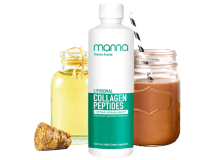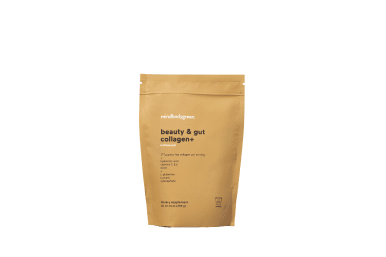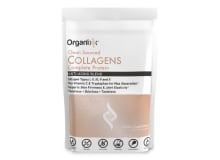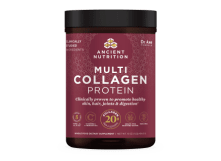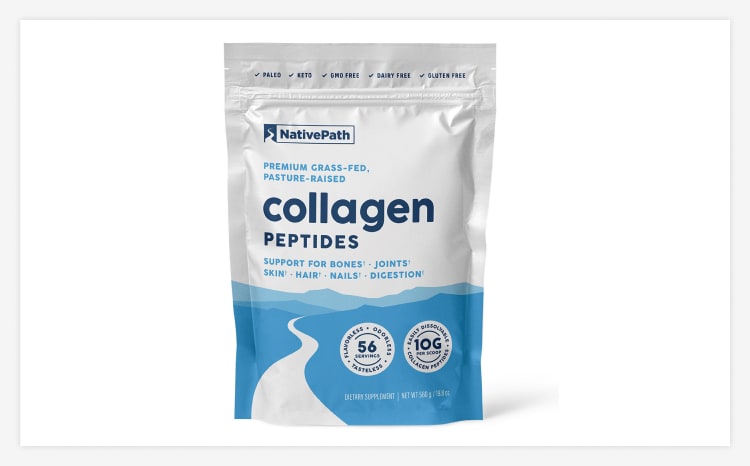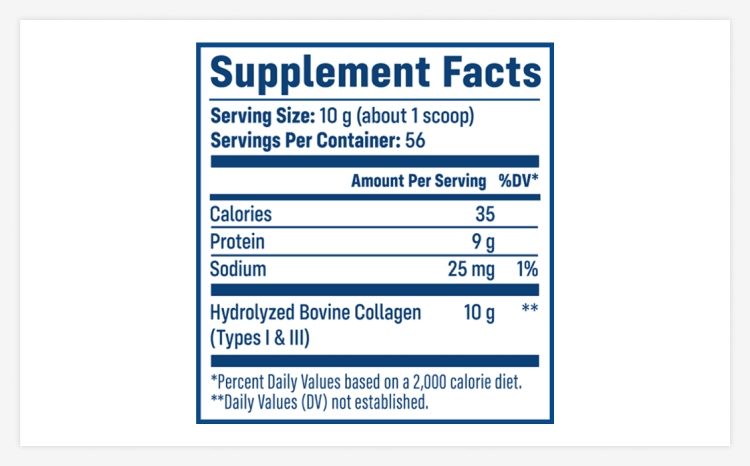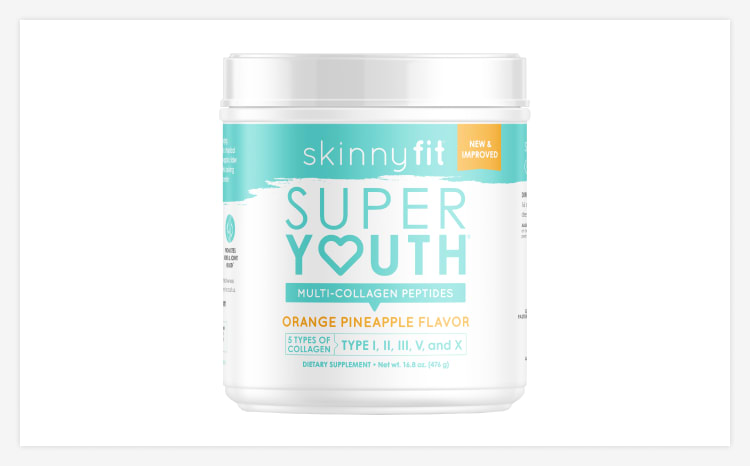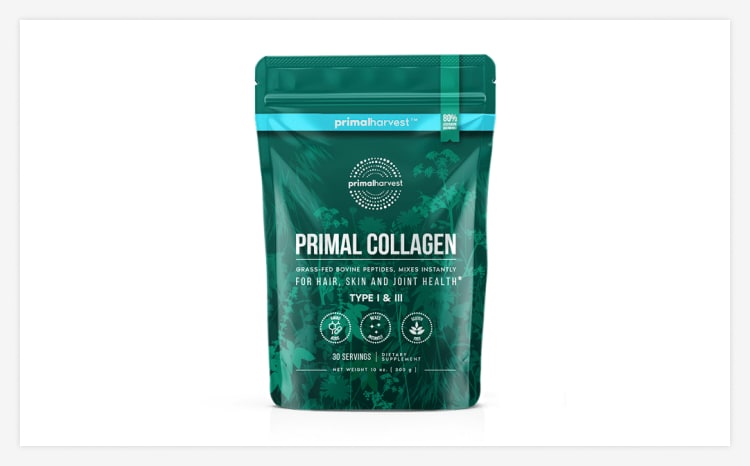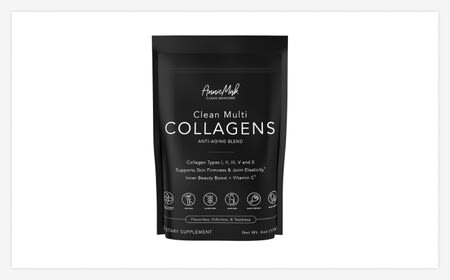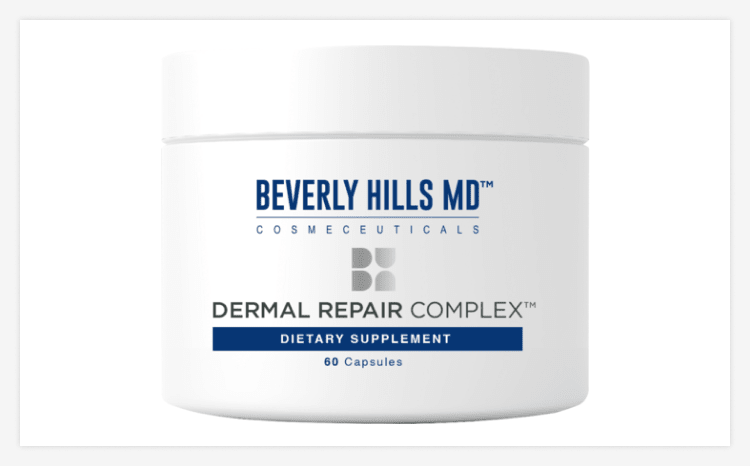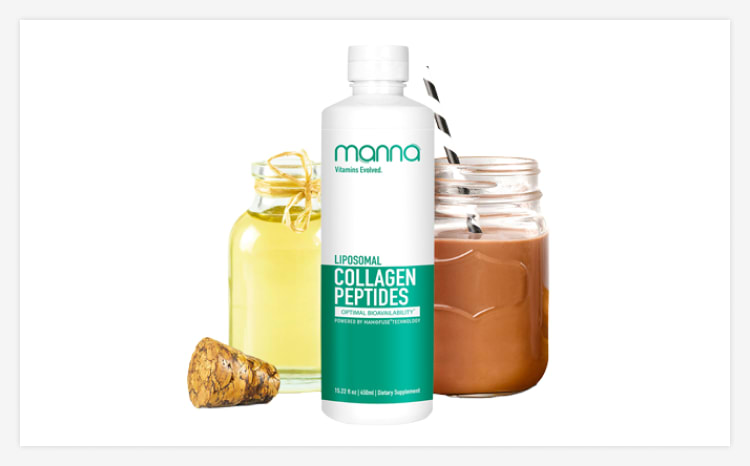Collagen Supplements Benefits
Collagen has become a hot topic in the health space due to its crucial role in helping maintain our overall health and well-being.
The human body’s ability to produce collagen fades with age, and other factors, like poor diet, can also slow the body’s collagen production. Reduced levels of this protein can result in brittle nails, fragile hair, saggy skin, and wrinkles. It’s no wonder that taking supplements have become popular to support the body's collagen levels.
It’s easy to assume that collagen is mainly a beauty supplement—however, it also contributes to joint and digestive function. Type II collagen helps joint integrity, preserving the cartilage that cushions and supports your joints.
Type III collagen supports the body’s organs and digestive system, meaning supplements containing this ingredient can support healthy digestion. While there are many potential benefits to taking collagen supplements, it's a good idea to consult a healthcare professional to ensure it's safe for you.
Who Shouldn’t Take Collagen Supplements?
Collagen peptide supplements can only be derived from animals, so they’re not suitable if you’re on a vegan or vegetarian diet. No plant-based variations are available yet, but you can try “collagen boosters”—collagen-free supplements that help support the body’s natural collagen synthesis.
You can take collagen if you have an egg, fish, or shellfish allergy. However, read the label carefully to ensure that your selected brand hasn’t sourced its peptides from allergens you’re sensitive to. Collagen may also be inappropriate if you’re religious and follow a kosher or halal diet.
Types of Collagen Supplements
There are 28 types of collagen—each performing its own function within the human body. The most common varieties in supplements are types I, II, and III, with many products containing a combination of these.
Type I collagen makes up our skin, tendons, ligaments, and bones. It usually comes from bovine sources but could also come from fish. Type II is present in cartilage and is essential for our joints. Typically, this type of collagen is found in chicken. Finally, type III collagen, which comes from bovine sources, is present in our muscles and blood vessels and is vital for healing.
Collagen supplements come in various forms, including liquids and bars, but capsules and powders are the most common. Both are equally effective, as the pills are essentially collagen powder in a digestible capsule.
Powders are the most popular as they are more convenient, providing more collagen per serving. For example, a typical capsule contains 0.5 grams of collagen, whereas a scoop of collagen powder contains 10 grams. You would need to take 20 pills to get the same amount of collagen as one scoop of powder.
Collagen powder is also more flexible as manufacturers can include extra synergistic ingredients such as vitamin C, hyaluronic acid, or probiotics. These compounds help with the absorption of collagen and can also support gut health.
What to Look for When Buying Collagen Supplements
Collagen Types
There are many different collagen types. When you’re looking to buy supplements, ensure you know how each type will affect your body. Here’s a brief overview:
- Type I: Supports skin health, healthy hair and nails, and aids bone and joint health.
- Type II: Supports joint health and maintains joint comfort and healthy inflammatory response.
- Type III: Supports healthy digestion and skin.
You’ll see many scientific terms used to describe collagen supplements, but there are two main ones to note—denatured and undenatured.
Hydrolyzed collagen, collagen peptides, collagen powder, and collagen hydrolysate are all just different names for denatured collagen. This form of the protein has been broken down into smaller, easier-to-digest molecules through a process called enzymatic hydrolysis.
Undenatured collagen has not gone through this process and can take longer for the body to break down and absorb. Studies have shown that undenatured type II collagen (UC-II) is particularly effective at supporting joint health.
Absorption and Digestion
Since hydrolyzed and denatured collagen is more easily absorbed, it tends to be a better choice than its counterpart. Digestability can be a particularly important feature if you have tummy issues with certain supplements, especially those that are protein-based, or if you take multiple supplements at a time.
Ingredients
Ideally, as with any dietary supplement, there should be as few artificial ingredients, additives, and fillers as possible. After all, if you’re paying for collagen, you should be getting collagen. The exception is ingredients that deliver additional benefits, such as vitamin C or hyaluronic acid, which can aid collagen absorption.
Collagen supplements may also contain antioxidants, minerals, or probiotics, making them multi-purpose products.
Sustainability
Look for collagen from humanely raised and grass-fed cattle, free-range chickens, and wild-caught fish if animal welfare and sustainability are important to you. Consider taking an organic collagen supplement if you’re concerned about consuming chemicals.
Side Effects of Collagen Supplements
Some people may experience mild stomach discomfort or inconsistent bowel movements when taking collagen supplements for the first time.
Allergic reactions could occur in people with undiagnosed hypersensitivities. They could result in a rash, anaphylaxis, or liver abnormalities. It’s important to note that these kinds of side effects are extremely rare.
How To Take Collagen Supplements
Collagen’s effectiveness doesn’t appear to depend on the time of day you take it. Consider how you’ll be incorporating collagen into your routine. It may make sense to get your collagen in capsule form if you already take several other supplements in this way.
However, collagen powders can be more versatile in their use than pills. Flavored powders allow you to make a hydrating drink from your supplement. Look for a brand that offers some of your favorite beverage flavors—or try something different, like pink lemonade or fruit punch.
Unflavored collagen powder might be worth considering if an 8-12 ounce collagen cocktail doesn't fit your routine. It can be blended into coffee, smoothies, protein shakes, or even food, making supplementation seamless since it's added to items you already consume.
How Long Does it Take for Collagen Supplements to Work?
The amount of time it takes for you to see results from taking collagen supplements depends on multiple factors.
First and foremost, everyone’s body works differently depending on age, stress, diet, and so on. Lifestyle choices can affect your body’s metabolism and the way it processes collagen supplementation.
Secondly, consider the form of collagen supplements (powder, capsule, etc.), the types of collagen (Types I, II, III, V, and X), and the sources from which the collagen is extracted (bovine, chicken, eggshell, marine). Each of these factors can impact the rate of absorption and how quickly you see results.
Some collagen supplement suppliers claim results can be seen within 2-4 months, and many offer a money-back guarantee for that period of time or longer.
Are Collagen Supplements Safe?
Collagen supplements can be safe for healthy individuals when taken as directed. However, as the FDA does not regulate supplements, you should consider the following points when researching your purchase.
There’s a rare possibility of some containing potentially harmful ingredients that are not on the label, such as toxins or heavy metals. They could even contain banned substances, which would spell serious trouble for athletes subject to drug testing.
Choosing a collagen supplement that has been third-party tested is a good idea. This is a process where supplements are analyzed in a lab that has no affiliation with the supplement company. The lab objectively tests and verifies that the supplement’s contents are safe and consistent with what is shown on its label.
In the sports nutrition world, registered dietitians particularly value Informed Choice, NSF for Sport, and Labdoor as the most respected companies verifying supplements through independent labs. Third-party testing is optional and adds to manufacturing costs, so companies that undertake this get extra points for integrity. While browsing collagen products, check the labels for these companies' logos.
Visit labs’ websites to see a list of collagen products that are third-party tested. Regardless of what you decide, talk to your doctor before taking collagen or any other supplement if you are pregnant, breastfeeding, suffering from a chronic disease, or taking prescription medications.
Can You Take Too Much Collagen?
It is possible to take too much collagen. However, there doesn’t seem to be a clear and quantified threshold of how much you can take before it becomes unsafe. Some people have reported side effects like headache, dizziness, indigestion, diarrhea, and insomnia when taking more than the manufacturer’s recommended serving.
It's important to understand that how much you need to take and how often may depend on the type of collagen supplement you buy. Read the labels carefully. If you’re unsure what dose is appropriate, discuss this with your physician.
How Much Do Collagen Supplements Cost?
There’s a wide range of prices for collagen supplements, depending on the form you buy, the size of the container, the ingredients it contains, and the type of collagen it includes.
Generally, capsule forms are the most affordable at less than $1 per serving. Powder forms are slightly more expensive, especially if they come from organic sources or contain additional ingredients like hyaluronic acid. Liquid collagen supplements are the most costly—they can cost up to $5 per serving.
There are other ways to integrate collagen into your routine, with foods high in collagen, like bone broth. However, supplements are still likely to be the more cost-effective solution. Bone broth is also less versatile than powder and may be tedious to prepare.
Our Methodology: How We Rated the Best Collagen Supplements
We thoroughly evaluated the best collagen supplements of 2025, using our expertise to provide you with a complete guide. This simplifies the complexities of these products and empowers you to make informed decisions about your health. We rated the best collagen supplements based on the following criteria:
- Cost per serving
- Dietary restrictions and preferences
- Flavored or unflavored
- Health benefits
- Collagen type
- Collagen source
- Collagen form
- Quality of ingredients
A Few Final Points on Taking Collagen
Collagen has the potential to offer a range of physical and aesthetic benefits to the body. Exercise enthusiasts and athletes may consider taking collagen supplements to help maintain their bone and joint integrity. For women and men interested in beauty and cosmetics, collagen may also support dermatological health.
When considering collagen supplements, choose the right kind based on what you hope to achieve. Additionally, select the form and flavor (or lack thereof) that will encourage you to take the supplement consistently.
Finally, if it fits your budget, hydrolyzed collagen supplements offer better absorption and are easier for your body to digest.
Consult with your physician about safety and dosage if you have any concerns about starting supplementation.
Collagen is the most abundant form of protein in the human body, and acts like the “glue” that holds us together. As our bodies get older, collagen production levels begin to gradually decrease, resulting in thinner-looking hair, the appearance of fine lines, and weaker nails. Boosting collagen levels with supplements helps support the healthy appearance of skin, nails, and hair to keep us looking youthful. “With age, the ability to replenish collagen naturally decreases by about 1.0%-1.5% per year. This decrease in collagen is one of the characteristic hallmarks associated with the appearance of fine lines and deeper wrinkles.” (Reilly & Lozano, 2021: 'Skin collagen through the lifestages: importance for skin health and beauty')
While each collagen supplement reviewed in this page can help your body support a younger look, the “right” supplement for you will largely depend on your personal preferences regarding consumption (e.g. form and flavor). To help you make an educated choice, we also included details like pricing and return policies for each product so you can find the supplement that will best match your needs.
Some people prefer to increase consumption during the first 30 days in an effort to boost their collagen levels as quickly as possible. This technique is called “collagen loading” and can be easier to achieve with capsules since they’re quick and easy to ingest. Of course, “collagen loading” can be achieved with each form of collagen supplement whether it be powder, snack, or any other–at the end of the day it’s really a question of lifestyle and personal consumption preferences.
The Top10 collagen supplements and vitamins included on our list are all labeled as gluten-, soy-, sugar-, dairy-, and preservative-free. That said, collagen peptides do come from animal sources including bovine (cowhide), chicken, eggshells, and marine organisms such as fish and crustaceans. As such, the collagen supplements listed here are not vegan- or vegetarian-friendly.
Everyone’s body works differently, so individual results may vary. Generally speaking, the brands we compared report various results within 1-4 months. It’s important to note that all of the brands listed below offer a money-back guarantee, that way you can test out any collagen supplement without any wasted investment.
Collagen peptides, also known as hydrolyzed collagen, is collagen that is broken-down so that it’s easier for the body to absorb. Hydrolyzed collagen can also be easier to mix into liquids in powder form. Collagen supplements are commonly made with collagen peptides, regardless of the type or source of collagen.












